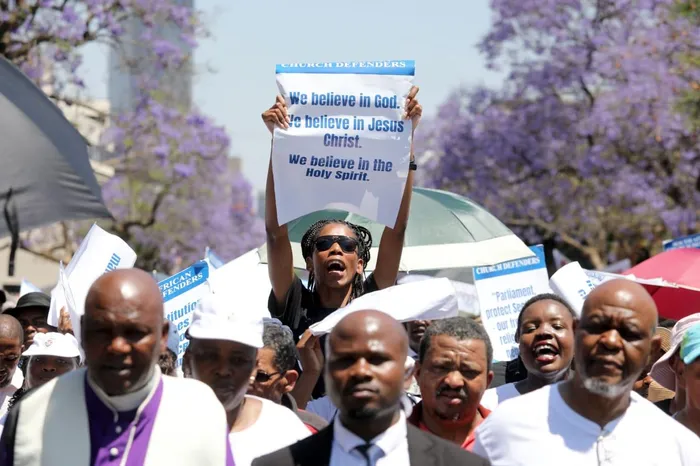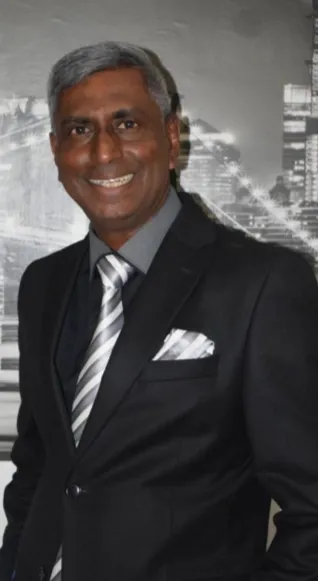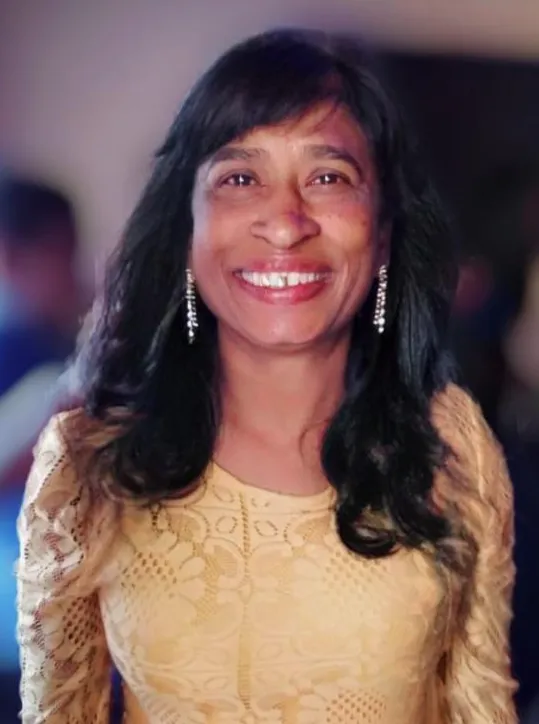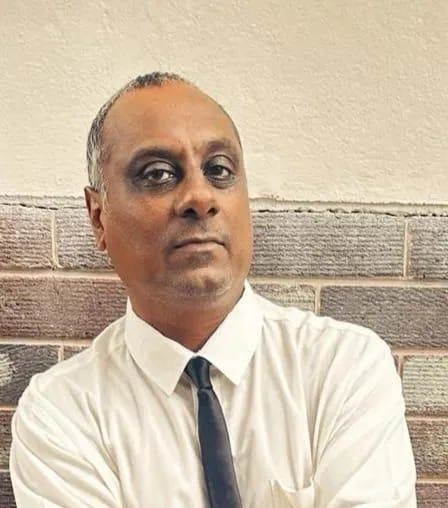Christian leaders say CRL Commission's regulatory committee is a threat to religious autonomy
"RELIGIOUS FREEDOM AT RISK"

Churchgoers from different churches marched to the Union Buildings last Wednesday to raise their objections to the Section 22 Committee established by the CRL Commission.
Image: Oupa Mokoena / Independent Newspapers
CHRISTIAN leaders across South Africa have expressed concerns over the Commission for the Promotion and Protection of the Rights of Cultural, Religious and Linguistic Communities’ (CRL Commission) new Section 22 Committee, fearing it represents government overreach and threatens religious autonomy.
While the CRL Commission claims that the aim of the committee is to protect congregants from abuse, Christian leaders argue the initiative undermines constitutional freedoms and could lead to State regulation of religious practices.
Mpiyakhe Mkholo, the CRL Commission’s senior communication and marketing manager, said pursuant to its mandate, the committee was established in an effort to contribute to finding solutions that will significantly safeguard the spiritual and emotional well-being of congregants.
“It is also intended to reaffirm principles that promote and advance the respect for human dignity of all people, and to bring an end to instances of abuse that have been reported to the commission and in the media. The road travelled to this point has not been without challenges, notably from disinformation campaigns falsely claiming that the CRL Commission advocates for state regulation of religion.
“On the contrary, the issue of concern has been and continues to be about the conduct or behaviour of certain religious leaders, who place their church members in harm’s way. The CRL Commission firmly asserts that freedom of religion is sacrosanct and an inviolable constitutional right that must never be compromised by any individual,” he said.
Mkholo said in 2015 and 2016, the CRL Commission conducted an investigation into the “commercialisation of religion and abuse of the people’s belief systems”.
He said the inquiry had unveiled a series of “appalling” incidents that shocked the nation and ignited widespread outrage within communities.
He said among the “disturbing” occurrences were individuals being sprayed with insecticide, made to ingest grass, and consumed petrol, as well as others seen chewing on snakes.
“Alarmingly, there were also serious allegations of sexual assault against young girls perpetrated by certain religious leaders, alongside harrowing cases where individuals were made to lie down and vehicles driven on them.
“The findings of this investigation were subsequently presented to the Portfolio Committee on Cooperative Governance and Traditional Affairs (CoGTA), which held discussions with a diverse array of religious leaders, resulting in a set of significant recommendations in 2018,” he said.
Mkholo said the portfolio committee noted the reported abuses in the religious sector and recommended a charter for self-regulation and a code of conduct for the sector, which should be recognised by legislation.
“In response to these recommendations from the portfolio committee regarding self-regulation in the Christian sector, the CRL Commission invoked Section 22 of the CRL Rights Commission Act to establish the committee, which has thus far been constituted and comprises Christian religious leaders from various umbrella organisations, including, inter alia, mainline, independent, charismatic, and pentecostal churches.
“For that reason, its mandate is to facilitate broad consultations and conduct dialogues within twelve months that would result in mechanisms and strategies to identify and three address challenges in the sector, halt the harmful practices of some religious leaders within their congregations exhibited by certain religious leaders, thereby ensuring an effective implementation of the portfolio committee’s recommendations regarding self-regulation of the Christian sector,” he said.
Mkholo added that the CRL Commission would not be part of the committee, except for the staff members who will provide administrative support.

Bishop Tony Haripersadh
Image: Supplied
Reaction
Pastor Nathan Naidoo, of the Higher Life Centre in Phoenix, said as a Christian leader committed to truth, justice, and the freedom of worship, he was firmly in opposition of the committee.
“While I acknowledge the stated intention of promoting accountability and curbing abuse within religious circles, the committee poses a serious threat to the spiritual independence and divine order of the Church. The Church of Jesus Christ is not a department of the State, it is the Body of Christ, governed by the Word of God and led by the Holy Spirit.
“In addition, Section 22 of the CRL Rights Commission Act blurs the line between a church and the State, introducing external regulation into sacred matters of faith, doctrine, and spiritual leadership. This directly undermines Section 15 and Section 31 of the South African Constitution, which guarantee freedom of religion and the right of faith communities to govern their own affairs,” he said.
Naidoo added that any attempt by a secular body to “oversee” or “review” Christian ministry contradicts God’s divine order.
“Accountability in the church must flow through biblical structures and not State-appointed committees. Though presented as a ‘peer-review mechanism’, the Section 22 framework opens the door to State interference in the internal affairs of the church. History shows that when the government begins to regulate faith; persecution, censorship, and compromise soon follow.
“I strongly believe the church must be accountable first to God, and second to one another in the Body of Christ. Let the church reform the church through prayer, unity, and spirit-led structures. True transformation will never come from regulation, but from repentance and revival,” he said.

Pastor Jannet Kisten
Image: Supplied
Bishop Tony Haripersadh, of Agape Community Fellowship in Phoenix, said he was also concerned about the impact on the sector.
“It is rather unfortunate that some religious leaders have exposed their worshippers to ungodly, distasteful practices that may have negatively impacted society. These need to be addressed and corrective measures must be taken.
“However, I am of the opinion that the majority of religious leaders and organisations in our country are sincere and honest in the exercising of their ministry. Many of these institutions already belong to umbrella bodies that self-regulate and enhance their worship practices,” he said.
Haripersadh added that giving the State total control over all religious organisations was a step in the wrong direction.
“This will hinder and have an adverse effect on those who are sincere and genuine in their relationship and worship to God Almighty. Our prayer is that the Lord will spare South Africa from this subtle attack on freedom of worship and religious practices,” he said.

Reverend Selvan Govender
Image: Supplied
Pastor Jannet Kisten, of New Wave Ministries in Chatsworth, said while she supported efforts to ensure integrity and safety in places of worship, she opposed the formation of the committee.
“I believe this move represents a clear path to government overreach, which threatens the religious freedom guaranteed by Section 15 of our Constitution. In addition, calling it self-regulation is misleading. When a regulatory body is mandated and overseen by a State affiliated commission, it is, in effect, a form of state control.
“We fear this will inevitably lead to interference with church doctrine, internal governance, and the fundamental right to preach and practice our faith without state approval,” she said.
Kisten said there were other solutions to addressing abuse such as fraud, assault, and financial exploitation with the church sector.
“These are already crimes recognised under existing South African law. The efficient solution is to enforce the current law against the few criminal actors, not to create a new, sweeping legislative mechanism that burdens the entire, law-abiding religious community.
“Furthermore, the process has been deeply problematic, showing a distinct lack of transparency in the selection of committee members. A single regulatory framework also fails to account for the immense diversity and differing theological structures across the Christian sector. We call on the Commission to abandon this regulatory path and instead empower faith communities to strengthen their own voluntary ethical codes. We will not surrender our hard-won constitutional freedoms for state imposed oversight,” she said.

Reverend Ethan Raphael Ramkuar
Image: Supplied
Reverend Selvan Govender, of The Safest Place on Earth in Verulam, said he believed the initiative represented a “trojan horse for State regulation of religion”.
“While I fully affirm that Christian ministers should demonstrate both academic and theological competence as a mark of their calling and professional integrity, there is a genuine and troubling danger that the CRL Commission is encroaching on the church’s autonomy. This could easily become a strategic segue to stifle religious freedom. It is only a matter of time before the noose tightens around the church’s neck and rights that biblically and historically belong to the church fall under government control.
“One must ask: Have existing laws against fraud, physical abuse, sexual abuse, and financial misconduct been so poorly enforced that the CRL Commission now sees itself as the guardian of the Christian faith? If these laws were properly implemented, would such State intervention even be necessary?,” he said.
Govender added that the composition of the 22-member oversight committee raises serious concerns.
“Its makeup appears unbalanced and vulnerable to bias. I see no meaningful inclusion of voices that reflect the racial diversity of South Africa, nor do I see women represented. This is particularly troubling since the Commission itself cited the abuse of women in the religious sector as a major rationale for intervention. Women play a vital role in the South African church, including in clergy leadership, and their exclusion signals impartiality and marginalisation at the very foundation of this initiative.
“This development is not merely administrative; it is a subtle yet potent attempt to erode the freedom of Christianity in South Africa. What may appear as oversight today could very well become control tomorrow,” he said.
Reverend Ethan Raphael Ramkuar, of Survival Centre Ministries in Chatsworth said: “Pastors and priests were called to be representatives of Christ and display his character. The State should never interfere in the house of God. However, at the same time the church should have nothing to hide from being regulated. However, pastors and priests irrespective of denominations should be registered for purposes of accountability.”
Related Topics: